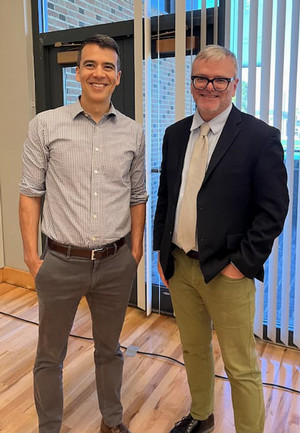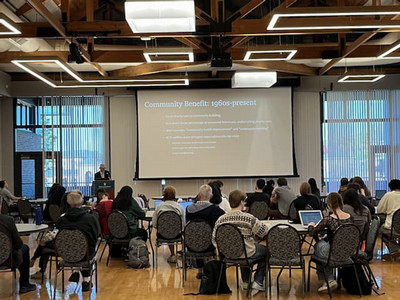Policy Prescriptions: Dr. Skinner on the Paradox of Medically Overserved Communities
 On October 25th, the Schroeder Center for Health Policy hosted Dr. Daniel Skinner, Professor of Health Policy at Ohio University, for a lecture titled “Urban Public Health and the Paradox of Medically Overserved Communities.” Moderated by Dr. Elyas Bakhtiari, Director of the Schroeder Center and Professor of Sociology, Dr. Skinner’s lecture and Q&A offered insight into prestigious hospitals in poor neighborhoods.
On October 25th, the Schroeder Center for Health Policy hosted Dr. Daniel Skinner, Professor of Health Policy at Ohio University, for a lecture titled “Urban Public Health and the Paradox of Medically Overserved Communities.” Moderated by Dr. Elyas Bakhtiari, Director of the Schroeder Center and Professor of Sociology, Dr. Skinner’s lecture and Q&A offered insight into prestigious hospitals in poor neighborhoods.
Exploring hospitals as urban objects of study beyond healthcare in his new book The City and the Hospital, Dr. Skinner and two sociologists, Berkeley Franz and Jonathan Wynn, conducted over 200 interviews in communities surrounding the University of Colorado Hospital, Hartford Hospital, and Cleveland Clinic to determine how hospitals expand, relocate, and restructure communities. Most importantly, Dr. Skinner was primarily interested in whether prestigious hospitals contribute to poor outcomes in surrounding neighborhoods.
To contextualize his research, Dr. Skinner began with a history of unequal access to medical care. Beginning with the Hall-Burton Act in 1948, which allocated government funding to hospitals but permitted segregation, Dr. Skinner noted African-Americans in these neighborhoods struggled with equal access to medical care decades after the Civil Rights Act in 1964. Though the Emergency Medical Treatment and Labor Act (EMTALA) in 1986 and Affordable Care Act (ACA) in 2010 attempt to redress these disparities with charitable care and community building responsibilities, Dr. Skinner argued that the EMTALA and ACA underspecify the processes necessary to address current medical disparities. To further push innovation, Dr. Skinner advocated for further regulatory guidance from federal, state, and hospital policies on community health initiatives and engagement.
Dr. Skinner suggested that the federal, state, and local governments could collaborate on six “policy prescriptions” to better address disparities between prestigious hospitals and poor neighborhoods. In addition to policy specificity, Dr. Skinner advocated for leveraging EMTALA’s funding mechanism for graduate medical education, rethinking graduate medical education curriculum on community engagement, respecifying the IRS’s definition of community benefit, re-envisioning hospital space in a more public facing way, emphasizing transparency, and creating protocols for community mistreatment.
In a brief question and answer session, Dr. Skinner further elaborated on his criticism of the ACA. Though an excellent first step towards medical equality, Dr. Skinner highlighted the ACA’s vague definition of community and programming as key factors for inefficiency. Since the under-specificity allows hospitals to create definitions, there are no agreed upon definitions or metrics for community improvement. By further elaborating on definitions, the federal government can guide hospitals more on community development and engagement.
Overall, Dr. Skinner’s lecture offered sociological and historical views of prestigious hospitals that drive policy making decisions and community well-being. By further investigating hospitals beyond healthcare policy, more information on their effects can be uncovered.
Watch a recording of the talk.














